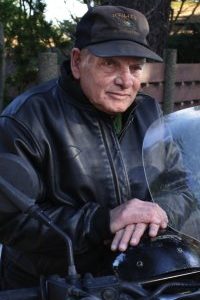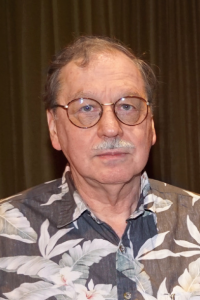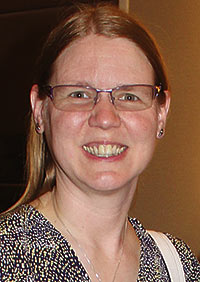Tobias S. Buckell: Many Hands Lift

Tobias Samuel Buckell was born January 2, 1979 in Grenada in the West Indies, where he lived for the first decade of his life before relocating to the British Virgin Islands and then US Virgin Islands. He moved to Ohio in 1995 in the aftermath of Hurricane Marilyn, which destroyed the boat his family lived on. Buckell graduated from Bluffton University with an English degree in 2000. His short stories and novels frequently draw on his Caribbean roots for inspiration.
Buckell attended Clarion in 1999, and shortly afterward sold first story ‘‘The Fish Merchant’’ to instructor Scott Edelman, then editor of Science Fiction Age. That same year his ‘‘In Orbite Medievali’’ was a Writers of the Future finalist. ‘‘The People’s Machine’’ (2008) was a Sidewise Award finalist, ‘‘A Militant Peace’’ with David Klecha (2011) was a WSFA Small Press Award nominee, and ‘‘Zen and the Art of Starship Maintenance’’ (2017) was a Theodore Sturgeon Memorial Award finalist. He has published about 75 stories in various magazines and anthologies, including Analog, Clarkesworld, Lightspeed, Nature, and Year’s Best anthologies. His short fiction has been collected in Tides from the New Worlds (2009), Nascence: 17 Failed Stories and What They Taught Me (2012), and Mitigated Futures (2013).
First novel Crystal Rain (2006) introduced readers to his Xenowealth universe, about far-flung human colonies menaced by aliens. Sequel Ragamuffin (2007) was a finalist for Nebula and Prometheus Awards, followed by Sly Mongoose (2008), The Apocalypse Ocean (2012), and collection Xenowealth (2015).
Near future novel of climate change Arctic Rising (2012) was a Prometheus Award finalist, and was followed by Hurricane Fever (2014), set in the same world. Space opera The Trove appeared in 2017. His next novel, fantasy The Musketress, is forthcoming as an audio original.
He collaborated with Paolo Bacigalupi on novella collection The Alchemist and The Executioness (2010). The two returned to that world for World Fantasy Award winning collection The Tangled Lands (2018).
Buckell co-edited anthology Diverse Energies with Joe Monti (2012) and edited anthology The Stories We Tell (2017) for the Bermuda Department of Community and Cultural Affairs. He wrote a pair of video game tie-ins, Halo: The Cole Protocol (2008) and Halo: Envoy (2017). He is an instructor at the Stonecoast MFA in Creative Writing program, and published a non-fiction book on writing, It’s All Just a Draft (2019).
Buckell was a finalist for the Campbell Award for Best New Writer in 2002. He was recently elected vice president of SFWA. He lives in Bluffton OH with his wife Emily and their twin daughters.
Excerpts from the interview:
”It is so encouraging to see the explosion of writers of color who have entered the genre, and yet we still have a way to go. I got dinged online years ago for writing about this. I considered the fact that SFWA had about 1,000 members at the time and said, ‘If you take the demographic break- down of the US – not the world, just the US – and look at the percentage of minority populations, and apply that to the 1,000 members, you’d see we need 200 Black science fiction writers. Just in the membership – not even outside, trying to write, or not interested in joining – to match the demographics of the US.’ SFWA has more members now, but I don’t think we’re anywhere close to 200 members yet. The same thing would go for Asian/Pacific Islanders and people like me who are biracial.
”We have come a long way, though. When I first entered the field, I’d say, ‘Who are the writers of color in the genre?’ and people would have three names – usually Butler, Hopkinson, and Delany. My response was, ‘You can’t throw those three names out as kind of a +10 spell to diversity.’ We need so many people that you don’t have three names. It was just the year before last that I hit a point where I hadn’t read every single writer of color in the field whose book came out that year. I was behind. At first I felt a horrible sense of guilt, and then I thought, ‘No, this is a good thing. I have to pick and choose now.’ That’s so freeing! We’ve hit an important inflection point. It used to be that I could read every story and book by a person of color coming from the publishing houses, and now I’ve got a bunch of books on my shelf that I haven’t read. Every time I look at them, I smile. ”When I first entered the field, people would say something like, ‘I read Nalo Hopkinson’s work, and then I read your work, and I have to apologize, but I don’t like yours.’ I had to say, ‘That’s okay – you’re not going to like every Caribbean SF writer’s work.’ I like the idea that there will be enough of us for people to say, ‘The ones I like are these writers, and the rest don’t do it for me.’ That’s why we need more writers of color: not every piece or writer is going to mesh with you, so we need a broad number of writers. We need that freedom of choice and that bountifulness in the field, with voices talking back and forth. Many hands lift. It’s tough when it’s just one person, because then you’ve got the weight of expectations on you alone. A reader might say, ‘I read this one Black space opera and I didn’t like it, so therefore Black space opera doesn’t work for me.’ There have been breakthroughs, but I still want to see 200.
”Everyone’s got to read P. Djèlí Clark’s The Black God’s drums. Karen Lord needs to be read more; her book Redemption in Indigo is a classic that I hope will be reprinted 50 years from now, because it’s genius. An Unkindness of Ghosts by Rivers Solomon came out from a literary press, so it didn’t penetrate the science fiction consciousness as much as I hoped. A lot of people have read it, don’t get me wrong, but initially it did not reach as many SF outlets, so people were less aware of it as SF. ‘Oh, it’s a book from Akashic, so it must be magical realism or something’ – no, it’s a generation starship. It doesn’t get much more science fictional than this. I’m not recommending these just because they’re Caribbean-descent people – I just love the books. I really enjoy Maurice Broaddus too. He’s got a space opera coming out soon and I can’t wait, because his story ‘Pimp My Airship’ was a lot of fun. Cadwell Turnbull came out with The Lesson, and he’s from St. Thomas, so I’ve got to give him big ups, right? Then there are the big names – Nora K. Jemisin, Nnedi Okorafor, who are amazing and were kind of part of my cohort coming up. Those are just the names that immediately jump to mind.
”I can’t speak for all brown folk, because for those of you who haven’t seen my pictures, I look white, I pass – but there’s this thing when you’re representing a whole group, and that’s an awful weight to bear. You want to be known as great in your field for your own sake, not just because someone has added a qualifier to your name. But at the same time, you’re proud of your identity. This is who I am. A lot of people ask, ‘If you pass, why do you spend so much time claiming you’re biracial? Why do you assert this identity so much?’ Because it’s what I am! I don’t need to hide it. I don’t feel like I’m claiming it really hard; I just acknowledge that it’s part of me. It’s a way to signal to other people that you’re out there, because these things matter. I don’t see passing biracial people in fiction very often. If you’re biracial, you have a slightly better biracial radar. Every once in a while I’ll see an actor on screen, and I’ll cock my head and do a quick Google search, and be like, ‘Yeah, I thought so. My boy, he’s up there on the screen. It’s nice to see one of us succeeding.’ It feels good to know you’re part of the game – part of the team.
”I didn’t realize how much I wanted to see myself in science fiction until I was reading Bruce Sterling’s Islands in the Net and Mona Lisa Overdrive by William Gibson. A third of Islands in the Net is set in Grenada, and Gibson had Rastafarians on a space station. It was like this huge lightning strike. I remember getting into the Grenada part thinking, ‘Okay, soon they’re going to leave their little tourist adventure and go back to the US,’ and they didn’t! Things happened, and a Grenadian character showed up and was awesome. That fit this missing thing inside of me: ‘Hell yeah, Grenada should be in science fiction. Hell yeah, there should be Caribbean people in science fiction. Why didn’t I notice this was miss- ing?’ Chimamanda Ngozi Adichie calls it ‘the myth of a single narrative,’ when you write stories about the dominant culture. When I look at fiction from my high school years, I was really imitative and never included stuff from the Caribbean – though at the same time I was drawing spaceships landing in Charlotte Amalie Harbor in St. Thomas. Until I read those books, I thought if I wanted to write literary fiction I could write about the Carib- bean, but if I wanted to write SF, I wasn’t allowed. I couldn’t bridge that gap on my own – I didn’t have the maturity and self-knowledge. This was before Nalo Hopkinson’s Brown Girl in the Ring existed. All I had was this model, and no offense to Sterling or Gibson, but I thought, ‘I actually live in Grenada, so I might be able to do a better job with those subjects.’ I was like, ‘Where were the rotis? Where are the Johnny cakes?’ That was an enormous gift of permission to start experimenting. I still wrote very imitative science fiction for a long time, but it gave me a widening idea of what I could do with SF. When I was in college, I saw Nalo Hopkinson, and met her by email, and she was an amazing mentor in terms of giving me the courage to think I could talk about the Caribbean in my science fiction.
”I wrote white male protagonists in my early days. My mother and father became estranged, so I was getting more and more removed from my father’s side of the culture. I grew up among white expats, basically, after a certain point, and white expat culture can be corrosive on matters of race. It took me a long time to understand a lot of the air I was breathing. It wasn’t until college that I looked back at some of my childhood and went, ‘Oh,’ and suddenly had those moments of realization and being horrified. When I was writing during that period, I thought, ‘Okay, if you want to write science fiction, it’s got to be white male protagonists and sexbots.’ I started writing when I was 13, so I soaked all that stuff up so uncritically. I started submitting stories when I was 13 to magazines in the States. I remember when I watched Adichie’s speech about the myth of the single narrative when it first came out on YouTube and it shook me, because I was like, ‘Oh my God, I went through the same process and thought I was a horrible human being.’ I thought I was a horrible person for starting out that way, and not understanding how much bigger my fiction could be.
”There’s more freedom in the Caribbean to be biracial, as it’s a post-colonial environment, and I view Canada and the US as a still-colonial environment. White people, descended from the plantocracy, still hold an incredible amount of power in those places, and structures that were put in place during the plantocracy and as reactions to the loss of plantocracy still hold great of power in the US. If you look at a lot of the institutional power structures that hurt poor white people and people of color in the States, it all traces back to trying to take power away from people of color. There are still global imbalances of power that hurt people in the Caribbean, but Caribbean nations are run by Caribbean peoples, for the most part, from about when I was born and moving forward. The Caribbean has a 50-year head start on the decolonization of nation structures. I was talking to this woman once in Cleveland, about being the one brown person holding the weight of expectations on you. She’d been the only Black student in an all-white school, and when she went to a college where she was one of the few Black students, she had a breakdown and checked into an institution because of the pressure of being a model minority. She had some Caribbean relatives, so her parents, who didn’t quite understand what happened, said, ‘You need a vacation, so we’re going to send you to the Virgin Islands for half a year, okay?’ She said it changed her whole life, because when she landed at Charlotte Amalie airport the taxi driver was Black, which she was used to – but the picture of the governor and the lieutenant governor on the plaques as she came in were Black too. Her relatives were all Black. The cops were all Black. It was this moment for her where everyone up and down the power structure she was seeing was Black, and she didn’t have to be a model minority – she could take six months to figure out who she was without having that pressure. Six months of deprogramming and then going back to the States allowed her to let go of all these expectations that had been put on her since she was a kid living under the US system.
”In the Caribbean, people are used to a wide number of different-looking people all around. If you go to Barbados and see a white person with a strong Barbados accent, it’s not a shocking thing. They’re from one of the white families who have been around – or they might not be white, right? The fact that I showed up and looked pale and said, ‘Yeah, my dad’s Black’ – none of my classmates ever questioned it. It wasn’t until I got to the States that people started getting angry about my identity. I grew up completely unshakeable in terms of that identity, though. Growing up in Grenada, everyone knew who my dad was; it’s an island of 100,000 people! You walk around Grenada and random people of all different shades walk up and say, ‘I’m your second cousin on your father’s side.’ Okay, seems about right. I felt comfortable identifying myself that way – until I came to the States, where people were really annoyed. There was this sudden pressure to identify as one side or another, and didn’t feel like I belonged with either. To be honest, I had more friends in the international club and in the African American Student Union when I was in college than I did anywhere else, because I would roll up and say, ‘Yeah, I’m not from rural Ohio.’ They were very accepting of me. African Americans in the US have a lot more experience with people being mixed. In the US there’s this pressure to either call yourself Black or white. I’m not what you would call physically black, so I wouldn’t feel comfortable saying that about myself, but I was never comfortable saying, ‘I’m white,’ either. Even though we were estranged from my dad, it felt like that would be completely erasing that entire side of my family. This is who I am. Half of my family is this, and of my family is that. I love that I exist.”
Interview design by Francesca Myman. Photo by Liza Groen Trombi.
Read the full interview in the June 2020 issue of Locus.
 While you are here, please take a moment to support Locus with a one-time or recurring donation. We rely on reader donations to keep the magazine and site going, and would like to keep the site paywall free, but WE NEED YOUR FINANCIAL SUPPORT to continue quality coverage of the science fiction and fantasy field.
While you are here, please take a moment to support Locus with a one-time or recurring donation. We rely on reader donations to keep the magazine and site going, and would like to keep the site paywall free, but WE NEED YOUR FINANCIAL SUPPORT to continue quality coverage of the science fiction and fantasy field.






